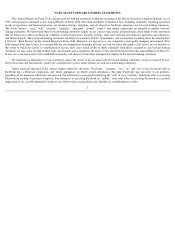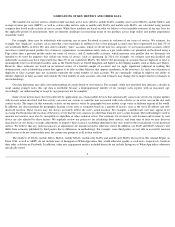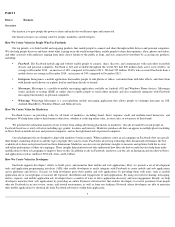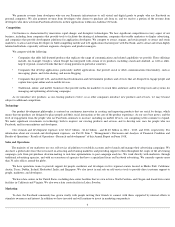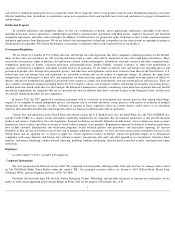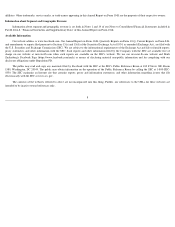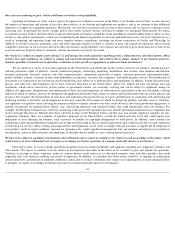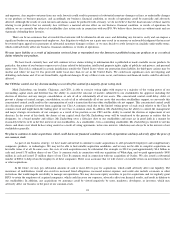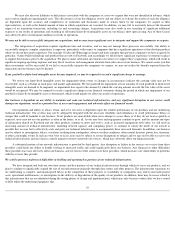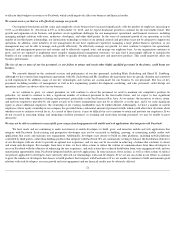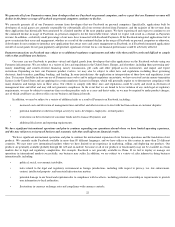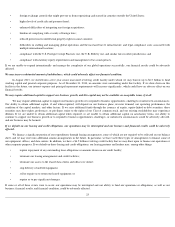Facebook 2014 Annual Report Download - page 16
Download and view the complete annual report
Please find page 16 of the 2014 Facebook annual report below. You can navigate through the pages in the report by either clicking on the pages listed below, or by using the keyword search tool below to find specific information within the annual report.
Action by governments to restrict access to Facebook or our other products in their countries could substantially harm our business and financial
results.
It is possible that governments of one or more countries may seek to censor content available on Facebook or our other products in their country,
restrict access to our products from their country entirely, or impose other restrictions that may affect the accessibility of our products in their country
for an extended period of time or indefinitely. For example, access to Facebook has been or is currently restricted in whole or in part in China, Iran, and
North Korea. In addition, government authorities in other countries may seek to restrict access to our products if they consider us to be in violation of
their laws. In the event that content shown on Facebook or our other products is subject to censorship, access to our products is restricted, in whole or in
part, in one or more countries, or other restrictions
are imposed on our products, or our competitors are able to successfully penetrate geographic markets
that we cannot access or where we face other restrictions, our ability to retain or increase our user base and user engagement may be adversely affected,
we may not be able to maintain or grow our revenue as anticipated, and our financial results could be adversely affected.
Our new products and changes to existing products could fail to attract or retain users or generate revenue.
Our ability to retain, increase, and engage our user base and to increase our revenue depends heavily on our ability to create successful new
products, both independently and in conjunction with developers or other third parties. We may introduce significant changes to our existing products, or
acquire or introduce new and unproven products, including using technologies with which we have little or no prior development or operating
experience. For example, in July 2014 we completed our acquisition of Oculus VR, Inc. (Oculus), a company developing virtual reality technology. We
do not have prior experience with consumer hardware products or virtual reality technology, which may adversely affect our ability to successfully
develop and market Oculus' products or technology. In addition, in October 2014, we acquired WhatsApp Inc. (WhatsApp), a cross-
platform mobile
messaging company. We currently monetize WhatsApp in only a very limited fashion, and we may not be successful in our efforts to generate
meaningful revenue from WhatsApp over the long term. If these or other new or enhanced products fail to engage users, marketers, or developers, or if
we are unsuccessful in our monetization efforts, we may fail to attract or retain users or to generate sufficient revenue, operating margin, or other value
to justify our investments, and our business may be adversely affected.
We prioritize user growth and engagement and the user experience over short-term financial results.
We frequently make product decisions that may reduce our short-
term revenue or profitability if we believe that the decisions are consistent with
our mission and benefit the aggregate user experience and will thereby improve our financial performance over the long term. For example, from time to
time we may change the size, frequency, or relative prominence of ads in order to improve ad quality and overall user experience. Similarly, from time
to time we update our News Feed ranking algorithm to deliver the most relevant content to our users, which may adversely affect the distribution of
content of marketers and developers and could reduce their incentive to invest in their development and marketing efforts on Facebook. We also may
introduce changes to existing products, or introduce new stand-
alone products, that direct users away from properties where we have a proven means of
monetization. For example, we have taken action to redirect users who send messages from within the Facebook application to our stand-
alone
Messenger application, although we currently do not monetize the stand-
alone Messenger application. In addition, we plan to focus on growing the user
base for Instagram, WhatsApp, and potentially other stand-alone applications that may have limited or no near-
term monetization, and it is possible that
these efforts may reduce engagement with the core Facebook application. We also may take steps that result in limiting distribution of mobile products
and services in the short term in order to attempt to ensure the availability of our products and services to users over the long term. These decisions may
not produce the long-
term benefits that we expect, in which case our user growth and engagement, our relationships with marketers and developers, and
our business and results of operations could be harmed.
13


